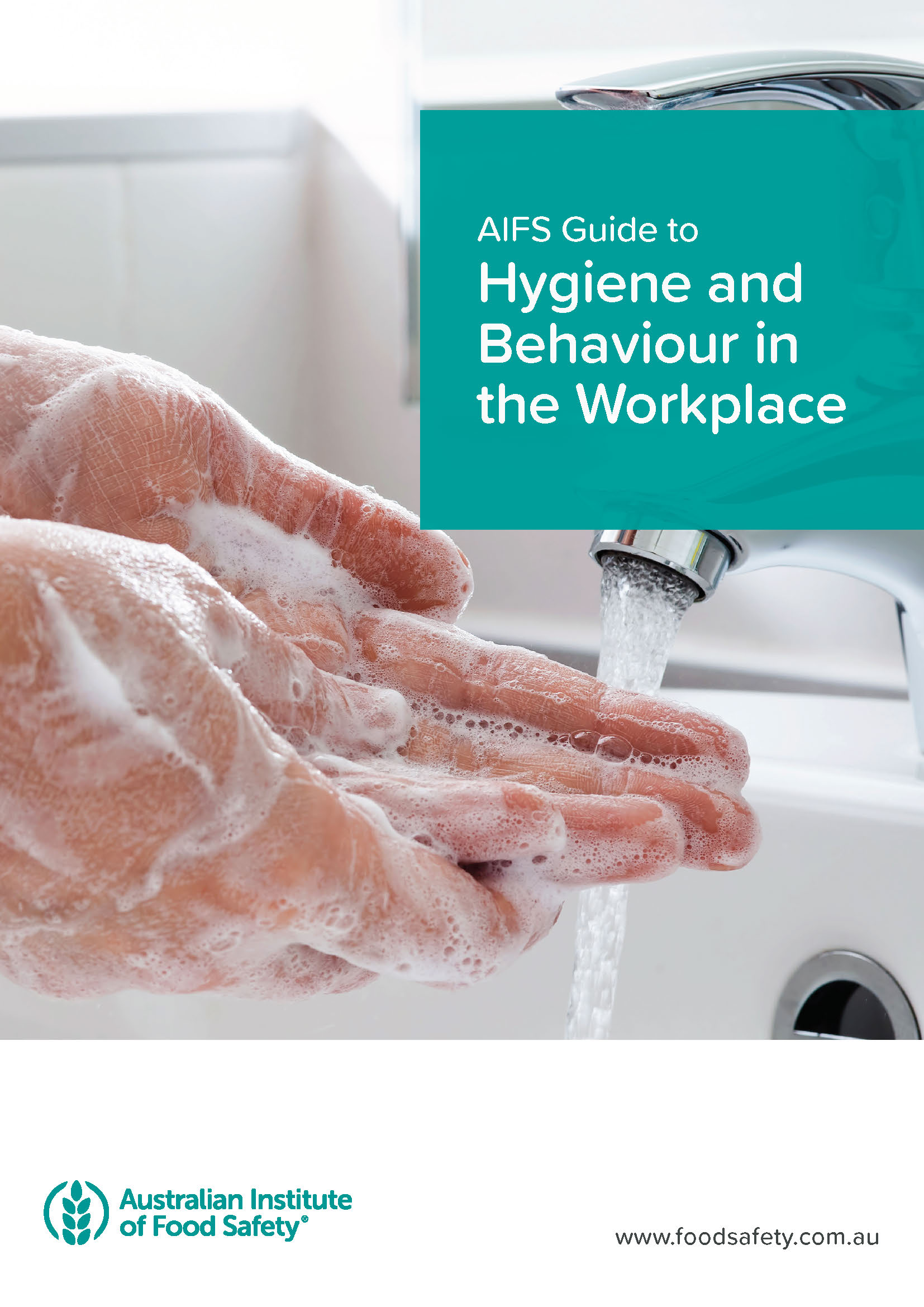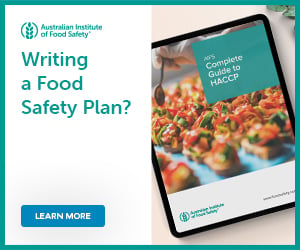
Poor hygiene can cause serious problems for a food business, up to and including a food poisoning outbreak.
This guide was developed to help food businesses, organisations and food workers to protect their customers and themselves from the consequences of a serious food safety incident.
Introduction
Poor personal hygiene can cause serious problems in a food business, up to and including a food-borne illness outbreak.
Besides ruining the business’s reputation, food-borne illness can cause customers to fall seriously ill, or even die.
As a Food Handler, it is important for you to practise good personal hygiene and follow safe food handling procedures to ensure a safe working environment and prevent the spread of food-borne illnesses.
WHAT IS A FOOD HANDLER?
A Food Handler is any person who works in a position where they are involved in food preparation or come into contact with food. This may be directly through cooking, packaging or serving food. It can also be indirectly through storing, transporting and delivering food.
Even those who come into contact with food preparation surfaces such as cutlery, crockery, benches and kitchen utensils are considered Food Handlers and are subject to the same rules and regulations as those who directly handle food.
Understanding Your Responsibilities Under the Food Standards Code
Under Food Safety Standard 3.2.2, Food Handlers have an overall responsibility to do whatever is reasonable to ensure that they do not make food unsafe or unsuitable for people to eat.
They also have specific responsibilities related to their health and hygiene. This means that as a Food Handler, you must do everything in your power to make sure that you are preparing food safely.
If you do not and your actions cause somebody to get sick (or worse), you could be held liable for damages or even prosecuted under the law.
Personal Hygiene
Good personal hygiene is essential for any Food Handler and minimises the risk of food contamination. Most people carry harmful bacteria on their bodies and can unknowingly transport them to food.
Touching your mouth, nose, hair or even your clothing can spread bacteria and cause contamination.
Even healthy people must practise good personal hygiene to minimise this risk.
As per Standard 3.2.2, the most important things a Food Handler must know to minimise the risk of food contamination are:
- to prevent their body, anything from their body or anything they are wearing from coming into contact with food or food contact surfaces
- to do whatever is reasonable to stop unnecessary contact with ready-to-eat food
- to wear clean outer clothing, depending on the type of work they do
- to make sure cuts, burns or wounds on any exposed parts of the body are covered with clean, waterproof bandages or dressings
- not to eat over unprotected food or surfaces likely to come in contact with food
- not to sneeze, blow or cough over unprotected food or surfaces likely to come into contact with food
- not to spit, smoke or use tobacco or similar products where food is handled
Of course, these are the basics. We will cover safe behaviour in the workplace in more detail later in this guide.
Hand Washing
Even if hands look clean, they can still harbour harmful pathogens.
Correct hand washing is paramount when working with food. Improper hand washing is one of the leading causes of food contamination and is responsible for the spread of potentially life-threatening food-borne diseases.
Food Handlers must wash their hands whenever their hands are likely to contaminate food.
This includes:
- before working with ready-to-eat food after handling raw food
- after using the toilet
- before starting to handle food
- after smoking, coughing, sneezing, using a handkerchief or disposable tissue, eating or drinking
- after touching their hair, scalp or a body opening
- after handling money
- after handling garbage or contaminated food
- after cleaning or handling chemicals
PROPER HAND WASHING TECHNIQUE
There are six steps to proper hand washing:
- Wet hands. Use hot water to wet your hands and remove any visible dirt or grime. Hot water is more effective than cold water. Hot water kills bacteria and removes oil that can harbour bacteria.
- Apply soap. Apply a liquid soap to your hands. Try to avoid or limit the use of bar soaps as they can harbour bacteria. In some locations, liquid soap is required under state / territory or municipal regulations.
- Lather and scrub. Rub your hands together well with soap for a minimum of 20 seconds. Make sure to thoroughly clean palms, the back of the hands, between each finger and under your fingernails.
- Rinse. Remove the soap using warm running water for at least 20 seconds. Be sure to point fingers downwards while rinsing.
- Turn off the tap. Use a paper towel to turn the tap off. Taps can be a breeding ground for bacteria when people turn them on using dirty hands.
- Dry hands. Use a paper towel and dry hands thoroughly. Do not use a tea towel or your apron as this will contaminate your hands again. Wet hands can carry up to one thousand times more germs than dry hands.
Food businesses are required to provide hand washing facilities with clean running water, soap, and paper towels. They must also ensure that these stations are used exclusively for hand washing and not for the preparation of food.
Illness and Injury
You should never prepare food for others if you suspect that you may be sick. Food Handlers are prohibited from working with food when they are sick because there is a high risk of transferring harmful pathogens onto the food they are working with.
You should not work with food when experiencing symptoms such as diarrhoea, vomiting, or a sore throat with a fever.
The only exception to this is if the Food Handler knows that they have these symptoms for a different reason (e.g. vomiting at work due to pregnancy).
If you suspect that you may be ill, you must inform your supervisor right away and stop working with food immediately. If you have to miss work due to illness, then you may need a medical certificate from a doctor to determine when you can return to work safely.
Food Handlers must tell their supervisor about any infections or conditions that may result in discharges from their ears, nose or eyes (e.g. a cold, seasonal allergies).
If you continue to handle food with such a condition, you must do whatever possible to make sure you don’t contaminate food. For example:
- cover infected sores or burns on bare skin with a waterproof bandage or dressings (be sure to change these often)
- take medication to dry up discharges from the ears, nose or eyes
Behaviour
Some things you do in the workplace can unintentionally increase the risk of food contamination. When moving around the workplace, remember the following tips:
- Avoid handling ready-to-eat foods with your bare hands. If you must handle ready-to-eat foods, use disposable gloves.
- If you cough or sneeze into your hands, always ensure you wash your hands thoroughly. If you sneezed while wearing gloves, replace the gloves immediately.
- Don’t touch your face, hair, jewellery or clothing while handling or serving food.
- Don’t taste food with your fingers or with utensils that are then returned to the food.
- Don’t smoke. If you do need to smoke, always ensure it is done well away from all food preparation areas, and be sure to wash your hands thoroughly afterwards.
- Wipe perspiration from your face with a cloth or paper towel, then wash your hands thoroughly.
- Avoid chewing gum while preparing food.
- Replace any protective clothing like aprons or gloves when moving from one food preparation area to another.
- Always know your company’s policies regarding moving between work stations.
As a Food Handler, being more aware of and taking steps to improve your hygiene and behaviour can have a significant impact on the health and safety of your customers and your community.
About the Australian Institute of Food Safety
As Australia’s largest provider of food safety education, the Australian Institute of Food Safety is dedicated to helping organisations protect their business and their customers from food-borne illness.
As a community focused organisation we deliver public health information to food businesses and consumers in order to improve food safety throughout Australia.
AIFS delivers nationally recognised training that meets all federal and state compliance requirements related to food safety. This includes Food Safety Supervisor and Food Handler compliance training.
The mission of the Australian Institute of Food Safety is to reduce food-borne illness within Australia by educating, advocating and promoting food safety.











